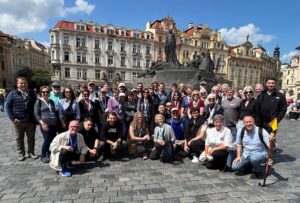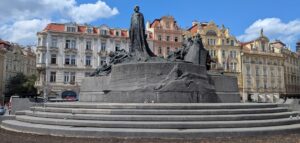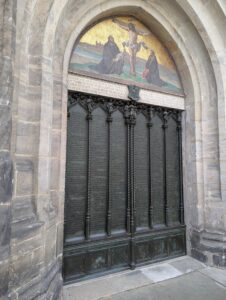 I remember watching the clips from Tucker Carlson’s interview with Senator Ted Cruz. It went off the rails quickly. Tucker hammered Ted on why the U.S. should support Israel. Ted went with the biblical promise that God made to Abraham, “I will bless those who bless you and curse those who curse you.” Unfortunately Ted could not remember where that verse is found. Tucker pounced on that fact and made Ted look like a biblical ignoramus.
I remember watching the clips from Tucker Carlson’s interview with Senator Ted Cruz. It went off the rails quickly. Tucker hammered Ted on why the U.S. should support Israel. Ted went with the biblical promise that God made to Abraham, “I will bless those who bless you and curse those who curse you.” Unfortunately Ted could not remember where that verse is found. Tucker pounced on that fact and made Ted look like a biblical ignoramus.
Then Tucker followed up with a pivotal question, “Is the Israel in Genesis the same as the nation of Israel run by Benjamin Netanyahu today?”
Ted said, “Yes.” Tucker mockingly chuckled.
 Up until that point, I had never really watched Tucker Carlson. I remember him on Fox News. I remember him wearing bow ties at one point early in his career. I remember hearing him argue conservative talking points along the way. But that was about it. I wasn’t aware of his recent skepticism and critique of the nation of Israel.
Up until that point, I had never really watched Tucker Carlson. I remember him on Fox News. I remember him wearing bow ties at one point early in his career. I remember hearing him argue conservative talking points along the way. But that was about it. I wasn’t aware of his recent skepticism and critique of the nation of Israel.
Recently on his podcast, Tucker hosted Nick Fuentes, a far-right white nationalist who has questioned and even joked about the death of six million Jews in the Holocaust. During the interview, Tucker said that Christians who support Israel (often called “Christian Zionists”) have a “brain virus.”
And Tucker’s harsh critique of Israel and its Christian supporters is not an anomaly. More and more conservative voices are joining the chorus, particularly younger people who tend to see the nation of Israel as “oppressive,” “genocidal,” and purveyors of “apartheid.” A recent survey indicated that only 32% of evangelicals aged 18-34 sympathize with Israel when it comes to the issue of Palestine and the recent war in Gaza.
So how should Christians respond to the nation of Israel?
Does the present-day geo-political nation of Israel have any ties to the Israel of the Bible?
And why does it matter?
To answer the last question first…yes, it certainly matters. In fact, it matters a great deal.
How one views the nation of Israel today has implications related to one’s interpretation of the prophecies and promises of Scripture, one’s theological understanding of eschatology, one’s view of God’s providence in historical events, one’s response to the divisive, pervasive political issues of our present time, and even one’s reaction to the individual Jews, Palestinians, or Muslims that one may encounter in every day life.
These are not small matters…as the “heat” often generated around this issue makes clear.
There is a lot that I cannot comment on as a pastor. I am a Bible teacher not a geopolitical expert, political pundit, or military strategist. But since many of these issues are rooted in biblical and theological interpretations, then hopefully I can add value to the conversation.
Three major principles govern my response to and support of the nation of Israel.
1. Present-day Israel is a secularly-governed, politically-divided nation.
Israel is a modern geo-political nation. It has a prime minister. It has a parliament, the Knesset, with representatives from over ten different political parties. There is not a unity of thought, policy, or political persuasion in Israel. So to treat Israel as a “monolith” is not accurate or helpful.
Modern Israel is by all accounts a secular, imperfect, divided nation, similar to our own.
Because of that, it is easy to criticize Israel, just like it is easy to criticize the U.S. There are no perfect governments. There are no perfect nations. There are no perfect politicians (which is stating the obvious!).
If Tucker Carlson or Candace Owens or any political pundit today wanted to find someone who could criticize Israel, point out its flaws, highlight its injustices, and accuse it of atrocities, then they could easily find them.
This is not “news.” It is choosing to paint a narrative based on what reaction you are hoping to provoke (and what reaction will increase one’s viewership).
The question is not whether Israel has failed or even been guilty of injustices and crimes. The question is whether their government system is set up in such a way to expose these wrongs and hopefully correct them.
America is also far from perfect. Depending on your agenda, you could highlight slavery, the treatment of native Americans, racial injustice, lynchings, Jim Crow laws, war crimes, military atrocities, and a whole host of other sins committed by our nation.
But, though far from perfect, America offers freedom, protection, and opportunities that many other nations (past and present) do not. I see Israel in the same way.
2. Present-day Israel is a historically-unforeseen, providentially-revived nation.
I do not know how a person could say that the existence of a Jewish nation today in the ancient land of Canaan is not close to miraculous. It is at least worthy of some degree of amazement.
The Jews as a people were nation-less, “homeless,” if you will, for millennia. Though they were in their ancestral homeland after their return from exile in 516 BC, they were still under the rule and oppression of other nations for centuries before ultimately being destroyed and dispersed in AD 70.
Jews were scattered throughout the world, never possessing a majority in any nation and often hated and persecuted in the places where they settled.
Though every Passover, the religious Jews proclaimed, “Next year in Jerusalem!” the hope seemed to be more of a wish dream than something that could ever be a reality. Even the Hebrew language was dead.
The Jews were a people without a land, without a government, without a language, and without a hope.
Early Christians often considered the Jews “Christ-killers” and a rejected people.
The Arabs subjugated them and persecuted them in their lands.
The Crusaders slaughtered Jews on the way to reclaim the Holy Land.
Medieval people blamed them for the Black Plague and expelled them or killed them for simply being “Jews.”
The Cossacks pillaged their villages and massacred over 100,000 of them in eastern Europe.
The Russians killed over 200,000 of them during the pogroms.
The Nazis sought their complete annihilation, executing 6 million of them during the Holocaust.
The “Jewish problem” was something that nations dealt with throughout history, with many labeling them, mischaracterizing them, hating them, expelling them, and shouting at them, “Jew, go back to Palestine!”
The fact that an actual Jewish nation emerged, survived, and flourished in the area of Canaan (called “Palestine” in the 2nd century to disassociate the Jews from their land) is actually pretty amazing.
And the fact that the Hebrew language was dusted off from the trash heap and revived as a modern language is unheard of in history. I don’t think it is too much to say that it is a miracle.
3. Present-day Israel is a prophetically-foretold, biblically-significant nation.
Yes, I believe that the present, geo-political nation of Israel today is tied to the past, historical nation of Israel in the Bible. I also believe that modern-day ethnic Jews are tied to the biblical Jews, the physical descendants of Abraham, Isaac, and Jacob. Based on the hatred that they have endured for millennia for being “Jewish,” then I think it is safe to say that a person who bears the Jewish identity, ethnicity, heritage, and history today is the same kind of “Jew” that Jesus, Peter, and Paul were in the New Testament.
The Nazis didn’t seem to have a problem identifying them as Jews, just as most anti-Semites today know who they are as well.
So why wouldn’t the nation of Israel today be tied to the ancient Israel of Scripture?
It seems that people like Tucker Carlson who mock the idea that there is any association between the two almost have a view that the world of the Bible should be separated from the world of reality today. Almost like the Bible is an ancient fairy tale not to be taken seriously. I beg to differ.
If God exists and Scripture is true, then I would fully expect that the nation of Israel would survive and still be around today.
Here is where theology and biblical interpretation come into play.
The Abrahamic Covenant is the foundational covenant of Scripture and is still applicable today.
God’s covenant with Abraham in Genesis 12 provides the basis of the rest of the covenants seen in Scripture. God’s promise is often summarized into three main parts: the land, the seed, and the blessing.
Now the Lord had said to Abram:
“Get out of your country,
From your family
And from your father’s house,
To a land that I will show you.
I will make you a great nation;
I will bless you
And make your name great;
And you shall be a blessing.
I will bless those who bless you,
And I will curse him who curses you;
And in you all the families of the earth shall be blessed.”Then the Lord appeared to Abram and said, “To your descendants I will give this land.” And there he built an altar to the Lord, who had appeared to him. (Gen. 12:1-3, 7)
The significance of this covenant is seen in the New Testament with Jesus’ genealogy being traced back to Abraham (Matt. 1:1), with Zacharias’ Spirit-filled declaration that God is going to fulfill the “oath that He swore to Abraham” in “His holy covenant” (Luke 1:72-73), with Christ’s kingdom being tied to Abraham, Isaac, and Jacob (Matt. 8:11; Luke 13:28), and with the gospel and salvation being specifically identified with the promise made to Abraham (Gal. 3:5-29).
And the land promise is not just an addendum to this covenant. God’s promise to give the land of Canaan to the nation of Israel is mentioned over 170 times in Scripture, with 55 of these references stating that God gave Israel the land “on an oath.”
Psalm 105:7-12 is just one example:
He is the Lord our God;
His judgments are in all the earth.
He remembers His covenant forever,
The word which He commanded, for a thousand generations,
The covenant which He made with Abraham,
And His oath to Isaac,
And confirmed it to Jacob for a statute,
To Israel as an everlasting covenant,
Saying, “To you I will give the land of Canaan
As the allotment of your inheritance,”
When they were few in number,
Indeed very few, and strangers in it.
If God does not ultimately fulfill His sworn oath to Israel, then we can rightfully ask, “Will God fulfill His promises to us today?” Maybe they are just “spiritualized” promises that God does not take seriously and that we have misunderstood.
The apostle Paul clearly states that God is not done with ethnic, national Israel.
Paul’s whole treatise in Romans 9-11 is centered on God’s covenant promises to the nation of Israel.
I say then, has God cast away His people? Certainly not! For I also am an Israelite, of the seed of Abraham, of the tribe of Benjamin. God has not cast away His people whom He foreknew. (Romans 11:1-2a)
I say then, have they stumbled that they should fall? Certainly not! But through their fall, to provoke them to jealousy, salvation has come to the Gentiles. Now if their fall is riches for the world, and their failure riches for the Gentiles, how much more their fullness! (Romans 11:11-12)
For I do not desire, brethren, that you should be ignorant of this mystery, lest you should be wise in your own opinion, that blindness in part has happened to Israel until the fullness of the Gentiles has come in. And so all Israel will be saved, as it is written:
“The Deliverer will come out of Zion,
And He will turn away ungodliness from Jacob;
For this is My covenant with them,
When I take away their sins.” (Romans 11:25-27)
Paul specifically warns Gentile believers not to “write off” the Jewish people nor, in arrogance, to assume that God will not graft them in again, at some future point when they finally receive Jesus, into the promises of the Abrahamic Covenant.
All the OT covenants were made with the nation of Israel (even the New Covenant). As Gentile believers, we are grafted into these promises. This is an act of God’s grace. And God’s grace is certainly strong enough to graft the Jews back into their own tree.
So how should believers respond to the Jewish people today?
Paul answers this question as well:
Concerning the gospel they are enemies for your sake, but concerning the election they are beloved for the sake of the fathers. For the gifts and the calling of God are irrevocable. (Romans 11:28-29)
Even in their unbelief, even in their rejection of Jesus the Messiah, even in their opposition to the church, they are still God’s chosen people, beloved for the sake of the fathers.
The nation of Israel will play a part in the final days of God’s redemptive plan.
Even those who may have a totally different view of the “end times” should at least be able to agree that God has some future plan for the Jewish people (see Romans 11:12, 25-27 above). What this will look like is certainly debated.
 But in reading Revelation 12, it seems fairly clear that the “woman” mentioned in this passage is not Mary (at least not Mary as an individual) but rather the nation of Israel as a whole (with the Jewish Mary being the woman through whom the promised Seed came). The whole context points to Israel as a people, as a nation, through whom the Messiah was born.
But in reading Revelation 12, it seems fairly clear that the “woman” mentioned in this passage is not Mary (at least not Mary as an individual) but rather the nation of Israel as a whole (with the Jewish Mary being the woman through whom the promised Seed came). The whole context points to Israel as a people, as a nation, through whom the Messiah was born.
With that in mind, then it becomes clear that the “great dragon” (the symbol of Satan) has hated the Jewish people from practically the beginning of time.
Egypt tried to stop them by casting their babies into the Nile. Assyria sought to wipe them off the face of the map. Babylon destroyed their nation, took them into exile, and tried to assimilate them into Babylonian culture. Persia appointed a specific day when all the Jews could be killed without recourse. Greece tried to Hellenize them and destroyed all those who refused to comply. Rome subjugated them, oppressed them, and eventually razed Jerusalem to the ground. And this theme continued throughout the rest of history.
Over and over again, the Jews have been threatened with extinction.
Why?
Why is anti-Semitism called the “world’s oldest hatred”?
Why do many of the Arab nations today continue to refuse to acknowledge Israel’s right to exist and still hold to the Khartoum Resolutions–“no peace, no recognition, no negotiations”?
Why does Hamas and its supporters cry out in the streets, “From the river to the sea!” and “globalize the intifada!”?
Why, after just one generation from the Holocaust, are there people still blaming Jews for the world’s problems and calling for their condemnation, elimination, or annihilation?
It sure seems like the hatred goes much deeper than just political disagreement or even ethnic prejudice.
It seems spiritual.
The “great dragon” still hates them as a people, as a nation. He still hates the Messiah who emerged from their seed, born into the world as a Jew. He still hates the truth of Scripture, written, recorded, and preserved by the Jews. He still hates the church which began with the preaching of the Jewish disciples. And He still hates the surviving Jewish remnant today who will one day receive their Messiah, the Son of David, the Son of Abraham, the promised hope of God’s covenant with Abraham, Isaac, and Jacob.
If the dragon still hates them, and all that is associated with them, then is it a surprise that he can spread that hatred among people today, even among those who claim the Jewish Messiah as their Savior?
I say “no.”
In fact, it should be expected.
Supporting the nation of Israel does not mean that they get a free pass on their political policies, decisions, or practices. It does not mean that they cannot be rightfully criticized when they “cross the line” and commit injustices. It does not mean that the Palestinians, Arabs, and Muslims are to be mistreated or hated or seen as anything other than people “made in the image of God” and for whom Christ died.
But it does mean that we are to support the right of the nation of Israel to exist in their ancestral, promised homeland, to acknowledge their unique contribution to world history and to the Christian faith, to see their vital connection to the covenants of God, to oppose any form of anti-Semitic thought, propaganda, or actions, and to rejoice in the hope that one day the Jewish people will finally receive their Messiah.
So don’t get your talking points from Tucker Carlson, Candace Owens, Nick Fuentes, or any other political pontificating televangelist.
Instead, read Scripture.
And pray for the peace of Jerusalem.
May they prosper who love you. (Psalm 122:6)


 But I did not know that he was a young husband and father, with a 3-year old and 16-month old at home with his wife, Erika. I did not know that he was growing more and more in his Christian faith, becoming bolder and bolder in his witness to the death and resurrection of Jesus Christ on college campuses. I also did not know that he was so controversial, and so hated, among many who disagreed with him. I found that last fact out when I posted a simple tribute on my Facebook page and began to look at some of the posts about Charlie Kirk on the pages of some of my other Facebook friends.
But I did not know that he was a young husband and father, with a 3-year old and 16-month old at home with his wife, Erika. I did not know that he was growing more and more in his Christian faith, becoming bolder and bolder in his witness to the death and resurrection of Jesus Christ on college campuses. I also did not know that he was so controversial, and so hated, among many who disagreed with him. I found that last fact out when I posted a simple tribute on my Facebook page and began to look at some of the posts about Charlie Kirk on the pages of some of my other Facebook friends. is what is practically indisputable: Charlie Kirk loved to debate…but he also loved the people he debated. He wanted the free exchange of ideas. He wanted to engage.
is what is practically indisputable: Charlie Kirk loved to debate…but he also loved the people he debated. He wanted the free exchange of ideas. He wanted to engage. 










